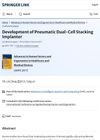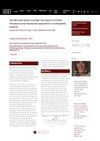 2 citations,
August 2013 in “The Lancet. Diabetes & endocrinology”
2 citations,
August 2013 in “The Lancet. Diabetes & endocrinology” The FDA rejected a testosterone drug again due to safety concerns.
 2 citations,
November 2011 in “InTech eBooks”
2 citations,
November 2011 in “InTech eBooks” Most adrenal cortex tumors are benign and non-secreting, but proper diagnosis and treatment are important due to the rare possibility of cancer.
[object Object]  2 citations,
October 2008 in “The Journal for Nurse Practitioners”
2 citations,
October 2008 in “The Journal for Nurse Practitioners” The document concludes that managing PCOS requires a comprehensive approach, including lifestyle changes and medication, to improve symptoms and reduce health risks.
 1 citations,
January 2020 in “Journal of quality in health care & economics”
1 citations,
January 2020 in “Journal of quality in health care & economics” Most Sudanese married women in the study used contraceptives and knew about them, but many didn't know about emergency contraceptives or extra benefits beyond family planning.
 1 citations,
January 2017 in “Elsevier eBooks”
1 citations,
January 2017 in “Elsevier eBooks” The document concludes that new treatments for hair loss may involve a combination of cosmetics, clinical methods, and genetic approaches.
 January 2025 in “Frontiers in Immunology”
January 2025 in “Frontiers in Immunology” IVIG therapy significantly improved symptoms in a patient with APS-2 and SPS.
 March 2024 in “Research Square (Research Square)”
March 2024 in “Research Square (Research Square)” Combining genetic and physical trait analysis improves diagnosis accuracy for monogenic diabetes.
 February 2024 in “International neuropsychiatric disease journal”
February 2024 in “International neuropsychiatric disease journal” Alopecia areata severely impacts quality of life, mental health, and work productivity.

Stress significantly contributes to hair loss, especially in women and those aged 31-40.
 September 2023 in “International journal of medicine”
September 2023 in “International journal of medicine” AI is revolutionizing healthcare by improving diagnosis, treatment, and monitoring, but still needs close supervision.
 January 2021 in “Turkiye Klinikleri Journal of Dermatology”
January 2021 in “Turkiye Klinikleri Journal of Dermatology” The MPV/PC ratio can help assess disease activity in alopecia areata.
 May 2020 in “Fertility and Sterility”
May 2020 in “Fertility and Sterility” Nonobese, normotensive Indian women with PCOS may have a higher risk of heart problems linked to inflammation and insulin resistance.

Diet and supplements can significantly affect acne, with some foods and nutrients reducing and others worsening it.
 February 2018 in “Egyptian Journal of Radiation Sciences and Applications”
February 2018 in “Egyptian Journal of Radiation Sciences and Applications” Patients with Discoid Lupus Erythematosus have lower vitamin D and antioxidant levels and higher oxidative stress.
 November 2014 in “John Wiley & Sons, Ltd eBooks”
November 2014 in “John Wiley & Sons, Ltd eBooks” Eating high-glycemic and dairy foods can increase hormones that may cause acne and other health issues.

Wound healing is complex and requires more research to enhance treatment methods.
 January 2011 in “Side effects of drugs annual”
January 2011 in “Side effects of drugs annual” Tretinoin gel is safe for sun exposure, but tacalcitol doesn't significantly improve non-segmental vitiligo.
 August 2007 in “Drug and therapeutics bulletin”
August 2007 in “Drug and therapeutics bulletin” Eflornithine's effectiveness for women with facial hirsutism is unclear.
 January 2020 in “Archives of urology”
January 2020 in “Archives of urology” Finasteride, a drug used for certain conditions, can cause serious side effects like sexual dysfunction, suicidal thoughts, and increased diabetes risk, and there's a need for more awareness and research about these effects.
 July 2008 in “British Journal of Dermatology”
July 2008 in “British Journal of Dermatology” Cyclosporin doesn't stop hair loss.
 June 2017 in “Advances in intelligent systems and computing”
June 2017 in “Advances in intelligent systems and computing” The new device can implant cell mixtures more effectively for hair loss treatment and is easier for operators to use.
 December 2023 in “Journal of Drugs in Dermatology”
December 2023 in “Journal of Drugs in Dermatology” Media coverage increased public interest in oral minoxidil for hair loss but may also spread misinformation.
 2 citations,
January 2011 in “Lecture Notes in Computer Science”
2 citations,
January 2011 in “Lecture Notes in Computer Science” A proposed robotic system could make hair harvesting for baldness treatment faster and more precise.
1 citations,
December 2020 in “The World Journal of Men's Health”  November 2023 in “Skin appendage disorders”
November 2023 in “Skin appendage disorders” Public interest in oral minoxidil for hair loss increased after a New York Times article.
 October 2023 in “Journal of The American Academy of Dermatology”
October 2023 in “Journal of The American Academy of Dermatology” Taking a small dose of the hair growth medicine minoxidil by mouth does not really change your blood pressure.
 March 2023 in “Journal of skin and stem cell”
March 2023 in “Journal of skin and stem cell” Trichoscopy is a good, quick, non-invasive way to diagnose different types of hair loss.
61 citations,
March 2022 in “JEADV. Journal of the European Academy of Dermatology and Venereology/Journal of the European Academy of Dermatology and Venereology” About 43% of people in Europe have had a skin condition in the past year, with fungal infections, acne, and eczema being the most common.
[object Object] 2 citations,
January 2017 in “Clinical approaches and procedures in cosmetic dermatology” The document concludes that understanding skin structure is essential for effective cosmetic treatments.
 July 2023 in “Journal of Cosmetic Dermatology”
July 2023 in “Journal of Cosmetic Dermatology” Practitioners treating hair loss need better education and resources to overcome challenges like commercial bias and ethical dilemmas.



























